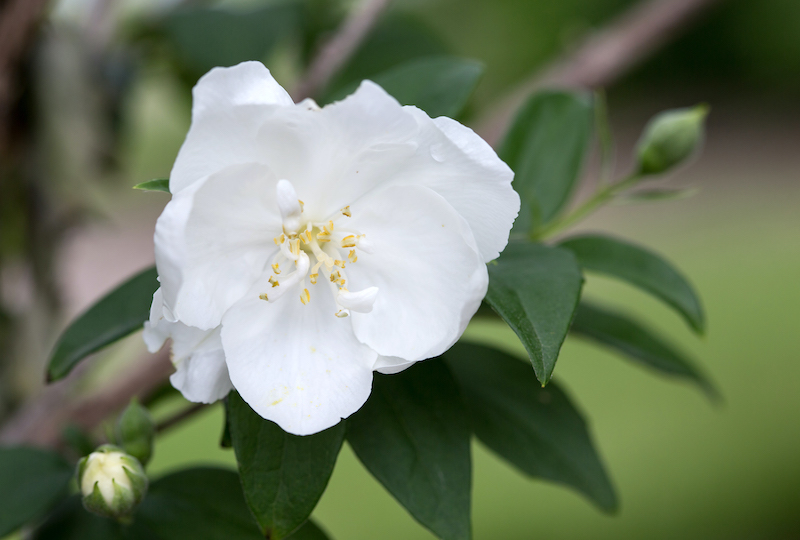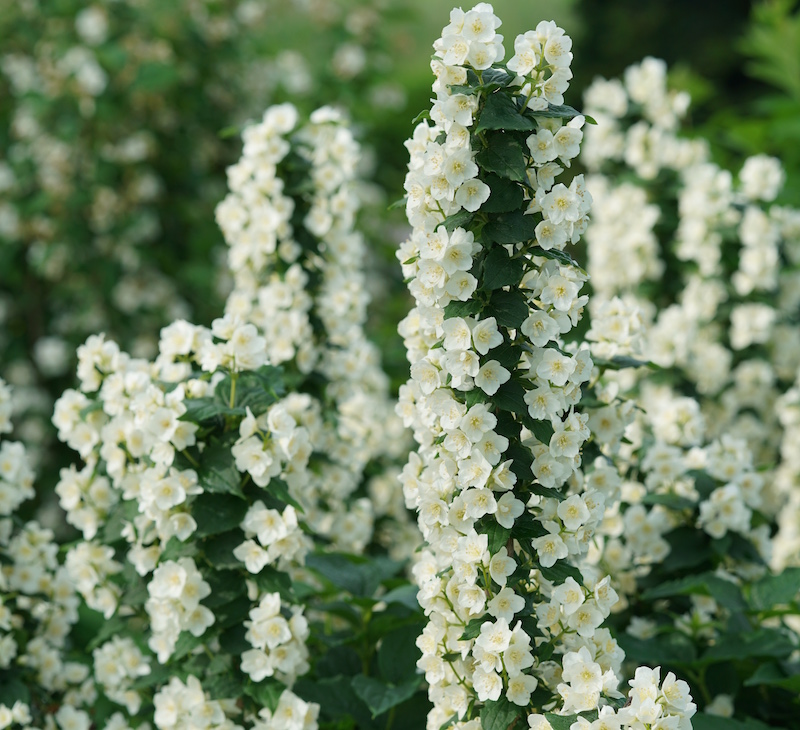Mock Orange is a perennial flowering shrub that boasts sweet-scented flowers during the late spring and early summer. This beauty is easy to grow and generally thrives with minimal care. Mock orange can add color, texture, and a lovely scent to your outdoor space. Philadelphus cultivars are safe for most family members, as this bush is not toxic to humans and dogs.

Some plants that share the common name Mock Orange, including Citrus trifoliata, Laurocerasus caroliniana, Poncirus trifoliata, and Prunus caroliniana, are considered poisonous, so be aware when selecting plants for your yard. Mock Orange is not a good plant to have around curious cats, as most varieties of this shrub are toxic to cats.
Is Mock Orange Poisonous to Children?
Philadelphus cultivars are child friendly, and most varieties do not pose a risk to little ones of any age. While the leaves and flowers are safe, the plant is not edible, so it is best to discourage young children from eating any part of it. Be careful when children are around plants, and be mindful of the specific type of plant.
Is Mock Orange Poisonous to Dogs?
Mock Orange plants are non-toxic to dogs, making this a safe perennial shrub to include in yards accessible to dogs or puppies. Most types of Mock Orange are safe, but this plant is not edible, and overeating may cause your canine to experience discomfort or an upset stomach.

Is Mock Orange Poisonous to Cats?
Mock Orange is nontoxic to cats and is a good shrub to include in a landscape with pets. Cats or kittens that have eaten the foliage or flowers of Mock Orange may experience stomach upset but are in no immediate danger.
Is Mock Orange Poisonous to Other Animals?
Mock Orange bushes (Philadelphus) are not poisonous to other animals; however, various plants go by this name. Pittosporum tobira, commonly known as Japanese Mock Orange, is not edible, but is safe for most animals, including livestock. Other plants that may be referred to as Mock Orange include Citrus trifoliata, Laurocerasus caroliniana, Poncirus trifoliata, and Prunus caroliniana, and these cultivars may be poisonous.
Symptoms Of Mock Orange Poisoning
Philadelphus cultivars are not poisonous, while other plants that go by Mock Orange may be poisonous. Always check with your doctor or veterinarian for guidance if you suspect Mock Orange poisoning.
Here are some common symptoms of plant poisoning to look out for:
- Vomiting
- Diarrhea
- Nausea
- Abdominal pain
Preventing Mock Orange Poisoning
Mock Orange shrubs in the Philadelphus genus are not poisonous, so it is not generally necessary to take measures to protect children and animals from these plants. Although curious animals may cause damage, fencing and scent-based deterrents are effective methods for protecting plants.
Pet Poison Helpline
If something were to happen to your furry friend, and you suspect that they are suffering from Mock Orange poisoning, there is a poison control hotline to call for 24/7 vet advice. It is called the Pet Poison Hotline, and their phone number is (855) 764-7661.
Sources:
"ND-Order-Materials-Plant-Guide." North Dakota Poison Center. ndpoison.org
"Cats and Dangerous Outdoor Plants." Cats Protection. cats.org.uk
 |
Author Alison Cotsonas - Published 01-23-2023 |
